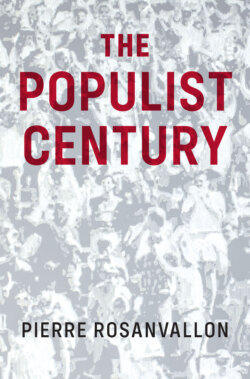Читать книгу The Populist Century - Pierre Rosanvallon - Страница 15
Them and us
ОглавлениеLaclau thus conceives populism as derived from a “horizontal logic of equivalence”5 that amalgamates the entire set of social demands. This amalgamation is made possible by the recognition that a common enemy exists, tracing the line of separation between “them” and “us.” The enemy can be characterized as a “caste,” an “oligarchy,” an “elite,” or a generalized “system.” The existence of this enemy is what draws an “interior borderline dividing the social realm into two separate and antagonistic camps” – a vision that is thus the polar opposite of a “liberal” understanding of conflicts and of social demands, which are viewed as always subject to possible compromise and arbitration. For Laclau, the populist project entails a radicalization of politics as a process of construction and activation of a friend/enemy relation. Hence his central concept of “antagonism,” which allows him to characterize conflicts for which no rational and peaceful outcome is possible. Hence, too, his fascination – shared by Chantal Mouffe – with the work of Carl Schmitt, in particular Schmitt’s political theory and his radical anti-liberalism. This fascination constitutes one of the intellectual links between right and left populism, moreover, as attested by the convergence between Laclau’s analyses and those of thinkers such as Alain de Benoist.6
The designation of an “enemy of the people” is not based on a simple acknowledgment of opposing interests or of competition for power. It also has an instinctual dimension, based on a sense that the “enemy” sets itself apart, displays contempt, lacks compassion. Populist movements strongly emphasize the power of affects in political mobilization: they help promote the feeling that worlds foreign to one another are in confrontation and that the barriers between “them” and “us” are insurmountable. These movements invoke the lack of humanity on the part of a “caste,” an “elite,” or an “oligarchy” in order to justify and legitimize the hatred manifested toward these enemies, who are perceived as having seceded, morally and socially, from the common world. Hence the virulence of the diatribes against those who “stuff themselves” at the expense of the people, the stigmatization of the “financial wizards” who “pig out,” “gorge themselves” with riches, and cut themselves off from their fellow citizens in countless ways. The figures of the politician, the billionaire, and the technocrat are superimposed and denounced as similarly execrable.
